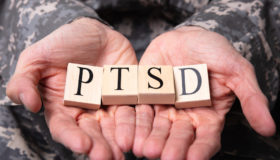Finding Your Way Back: Self-Care Advice for Those with PTSD and Depression
Many people who undergo a traumatic event gradually recover, but with PTSD, symptoms don’t dissipate; they often get worse. With the proper treatment, coping skills and self-care habits, PTSD and depression can be overcome, and you can find your way back to the life you deserve, free of fear and anxiety.
October 19, 2018

This blog post is a guest blog from Jenny Wise, a blogger at Special Home Educator.
If you suffer from post-traumatic stress disorder (PTSD) or depression, you’re probably familiar with how it feels to deal with anxiety, fear, sadness, and feelings of isolation. The persistence of these feelings and the sense that you may never feel secure, happy or normal again are not uncommon with PTSD and depression. Many people who undergo a traumatic event gradually recover, but with PTSD, symptoms don’t dissipate; they often get worse. With the proper treatment, coping skills and self-care habits, PTSD and depression can be overcome, and you can find your way back to the life you deserve, free of fear and anxiety.
Overcome your powerlessness 
People suffering from PTSD and depression often are overwhelmed by a sense of powerlessness and a feeling that the control they once held over their own lives has been irretrievably taken away. It’s important to reestablish a sense of that control in your own mind by getting involved again. Getting involved can take many forms, from volunteering with a charitable organization to reaching out to a friend who’s going through a hard time.
There are a number of self-care tactics that can help you feel like yourself again. Learn and practice relaxation exercises, such as meditation or yoga. Engage in a favorite physical activity, such as walking, swimming or dancing, or return to a sport you enjoy, like tennis or golf. Spend time in nature walking through the woods, doing some bird watching, hiking, or camping. Anything that improves your sense of well-being and leaves you feeling mentally refreshed is a definite step in the right direction.
Take sleep seriously
Sleep is vitally important for helping you deal positively with the symptoms of depression and PTSD. If you’re well-rested, you’re less likely to experience stress and frustrations during the day that can lead you back to negative coping behaviors. It is recommended that adults get 7 to 9 hours of sleep each night for good health, which depends to a great extent on establishing an environment that’s conducive to restful sleep, one that’s completely dark with no screens left on, and set at a comfortable 72 degrees.
Don’t underestimate the importance of a good mattress, which should have the right amount of support and be conducive to the way you like to sleep (on your side, back or stomach). Take note of the age and condition of your mattress; one that’s in the 7-to-10-years-old range is likely no longer providing adequate support and should probably be replaced.
A healthy lifestyle
Ultimately, self-care is about maintaining a healthy lifestyle. That means eating right, getting enough sleep, avoiding harmful substances (and people who use them), and getting at least 30 minutes of exercise every day. Begin each day with a well-balanced breakfast that includes protein and fiber. Maintain a regular eating schedule, and avoid foods that are high in sugar, salt and saturated fats. Include foods such as fish (omega-3 is good for your emotional well-being), nuts and flaxseed.
PTSD and depression can be difficult conditions to overcome and, left untreated, they can lead to other mental and physical health issues. If you suspect someone you know is suffering from PTSD or depression, remember that the sooner they seek help, the better. These are conditions that can seriously affect a person’s quality of life and lead to self-destructive substance abuse problems.
Courtesy of Pixabay.com.


